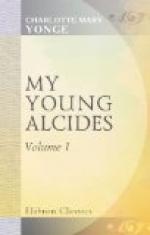“What kind of work?” I asked, anxiously.
“Doing what he meant to have done,” returned Harold, “for the poor. He said I should find out about it.”
“You must have been too young to understand much of what he meant then,” I said. “Did he not regret anything?”
“Yes, he said he had begun at the wrong end, when they were not ripe for it, and that the failure had ruined him for trying again.”
“Then he did see things differently at last?” I said, hoping to find that the sentiments I had always heard condemned had not been perpetuated.
“Oh yes!” cried Eustace. “They were just brutes, you know, that nobody could do any good to, and were only bent on destroying, and had no gratitude nor sense; and that was the ruin of him and of my father too.”
“They were ignorant, and easily maddened,” said Harold, gravely. “He did not know how little they could be controlled. I must find out the true state of things. Prometesky said I must read it up.”
“Prometesky!” I cried in despair. “Oh, Harold, you have not been influenced by that old firebrand?”
“He taught me almost all I know,” was the answer, still much to my dismay; but I showed Harold to the library, and directed him to some old books of my father’s, which I fancied might enlighten him on the subjects on which he needed information, though I feared they might be rather out of date; and whenever he was not out of doors, he was reading them, sometimes running his fingers through his yellow hair, or pulling his beard, and growling to himself when he was puzzled or met with what he did not like. Eustace’s favourite study, meanwhile, was “Burke’s Peerage,” and his questions nearly drove me wild by their absurdity; and Dora rolled on the floor with my Spitz dog, for she loathed the doll I gave her, and made me more afraid of her than of either of the others.
Harold was all might and gentleness; Eustace viewed me as a glass of fashion and directory of English life and manners; but I saw they both looked to me not only to make their home, but to tame their little wild cat of a child; and that was enough to make her hate and distrust me. Moreover, she had a gleam of jealousy not far from fierce in her wild blue eyes if she saw Harold turn affectionately to me, and she always protested sullenly against the “next week,” when I was to begin her education.
She could only read words of four letters, and could not, or would not, work a stitch. Harold had done all her mending. On the second day I passed by the open door of his room, and saw him at work on a great rectangular rent in her frock. I could not help stopping to suggest that Colman or I might save him that trouble, whereupon Dora slammed the door in my face.
Harold opened it again at once, saying, “You ought to beg Aunt Lucy’s pardon;” and when no apology could be extracted from her, and with thanks he handed over the little dress to me, she gave a shriek of anger (she hardly ever shed tears) and snatched it from me again.




